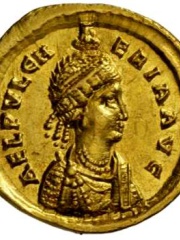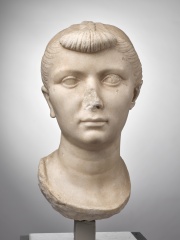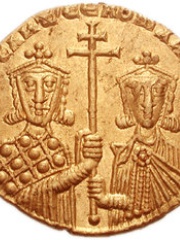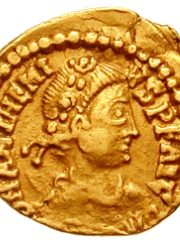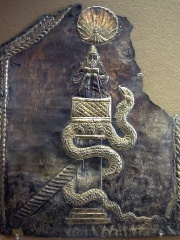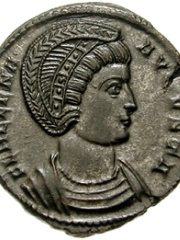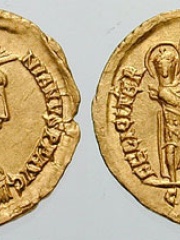Companion
Hecuba
EN.WIKIPEDIA PAGE VIEWS (PV)

 Hecuba
Hecuba
In Greek mythology, Hecuba (; also Hecabe; Ancient Greek: Ἑκάβη, romanized: Hekábē, pronounced [hekábɛ:]) was the wife of King Priam and queen of Troy during the Trojan War. With Priam, she was the mother of the warriors Hector and Troilus; Helen's suitor Paris; and the prophetess Cassandra. Read more on Wikipedia
Her biography is available in 50 different languages on Wikipedia (up from 47 in 2024). Hecuba is the 110th most popular companion (down from 75th in 2024), the 210th most popular biography from Türkiye (down from 152nd in 2019) and the 7th most popular Turkish Companion.
Hecuba is most famous for being the wife of Priam, the king of Troy. She is also famous for being the mother of Hector, Paris, and Cassandra.
Memorability Metrics
Page views of Hecuba by language
Among Companions
Among companions, Hecuba ranks 110 out of 784. Before her are Mariam-uz-Zamani, Louise of Mecklenburg-Strelitz, Margaret of Austria, Queen of Spain, Maria of Aragon, Queen of Portugal, Isabella of Aragon, Queen of Portugal, and Pulcheria. After her are Athaliah, Maria Amalia of Austria, Julia the Elder, Elisabeth of Austria, Queen of France, Emma of Normandy, and Margaret Tudor.
Most Popular Companions in Wikipedia
Go to all RankingsMariam-uz-Zamani
1542 - 1623
HPI: 73.82
Rank: 104
Louise of Mecklenburg-Strelitz
1776 - 1810
HPI: 73.78
Rank: 105
Margaret of Austria, Queen of Spain
1584 - 1611
HPI: 73.75
Rank: 106
Maria of Aragon, Queen of Portugal
1482 - 1517
HPI: 73.69
Rank: 107
Isabella of Aragon, Queen of Portugal
1470 - 1498
HPI: 73.67
Rank: 108
Pulcheria
399 - 453
HPI: 73.65
Rank: 109
Hecuba
HPI: 73.62
Rank: 110
Athaliah
900 BC - 860 BC
HPI: 73.54
Rank: 111
Maria Amalia of Austria
1701 - 1756
HPI: 73.48
Rank: 112
Julia the Elder
39 BC - 14
HPI: 73.42
Rank: 113
Elisabeth of Austria, Queen of France
1554 - 1592
HPI: 73.37
Rank: 114
Emma of Normandy
985 - 1052
HPI: 73.36
Rank: 115
Margaret Tudor
1489 - 1541
HPI: 73.33
Rank: 116
In Türkiye
Among people born in Türkiye, Hecuba ranks 210 out of NaN. Before her are Mausolus (-410), Andronikos III Palaiologos (1297), Numerian (254), Alexios III Angelos (1153), Pulcheria (399), and Thābit ibn Qurra (836). After her are Romanos II (938), Anthemius (420), Michael I Rangabe (770), Simeon Stylites (389), Pope John VI (655), and Mehmet Ali Ağca (1958).
Others born in Türkiye
Go to all RankingsMausolus
POLITICIAN
410 BC - 353 BC
HPI: 73.83
Rank: 204
Andronikos III Palaiologos
POLITICIAN
1297 - 1341
HPI: 73.76
Rank: 205
Numerian
POLITICIAN
254 - 284
HPI: 73.76
Rank: 206
Alexios III Angelos
POLITICIAN
1153 - 1211
HPI: 73.69
Rank: 207
Pulcheria
COMPANION
399 - 453
HPI: 73.65
Rank: 208
Thābit ibn Qurra
MATHEMATICIAN
836 - 901
HPI: 73.63
Rank: 209
Hecuba
COMPANION
HPI: 73.62
Rank: 210
Romanos II
POLITICIAN
938 - 963
HPI: 73.56
Rank: 211
Anthemius
POLITICIAN
420 - 472
HPI: 73.55
Rank: 212
Michael I Rangabe
POLITICIAN
770 - 844
HPI: 73.53
Rank: 213
Simeon Stylites
RELIGIOUS FIGURE
389 - 459
HPI: 73.51
Rank: 214
Pope John VI
RELIGIOUS FIGURE
655 - 705
HPI: 73.49
Rank: 215
Mehmet Ali Ağca
EXTREMIST
1958 - Present
HPI: 73.48
Rank: 216
Among Companions In Türkiye
Among companions born in Türkiye, Hecuba ranks 7. Before her are Helena (250), Aspasia (-470), Mihrimah Sultan (1522), Antinous (111), Malhun Hatun (1350), and Pulcheria (399). After her are Gülfem Hatun (1500), Agnes of Antioch (1153), Hümaşah Sultan (1540), Kaya Sultan (1633), Maria Laskarina (1206), and Licinia Eudoxia (422).
Helena
250 - 330
HPI: 85.76
Rank: 1
Aspasia
470 BC - 400 BC
HPI: 82.17
Rank: 2
Mihrimah Sultan
1522 - 1578
HPI: 81.60
Rank: 3
Antinous
111 - 130
HPI: 74.42
Rank: 4
Malhun Hatun
1350 - 1324
HPI: 74.09
Rank: 5
Pulcheria
399 - 453
HPI: 73.65
Rank: 6
Hecuba
HPI: 73.62
Rank: 7
Gülfem Hatun
1500 - 1561
HPI: 69.70
Rank: 8
Agnes of Antioch
1153 - 1184
HPI: 68.24
Rank: 9
Hümaşah Sultan
1540 - 1592
HPI: 67.77
Rank: 10
Kaya Sultan
1633 - 1659
HPI: 67.67
Rank: 11
Maria Laskarina
1206 - 1270
HPI: 67.32
Rank: 12
Licinia Eudoxia
422 - 493
HPI: 67.06
Rank: 13





